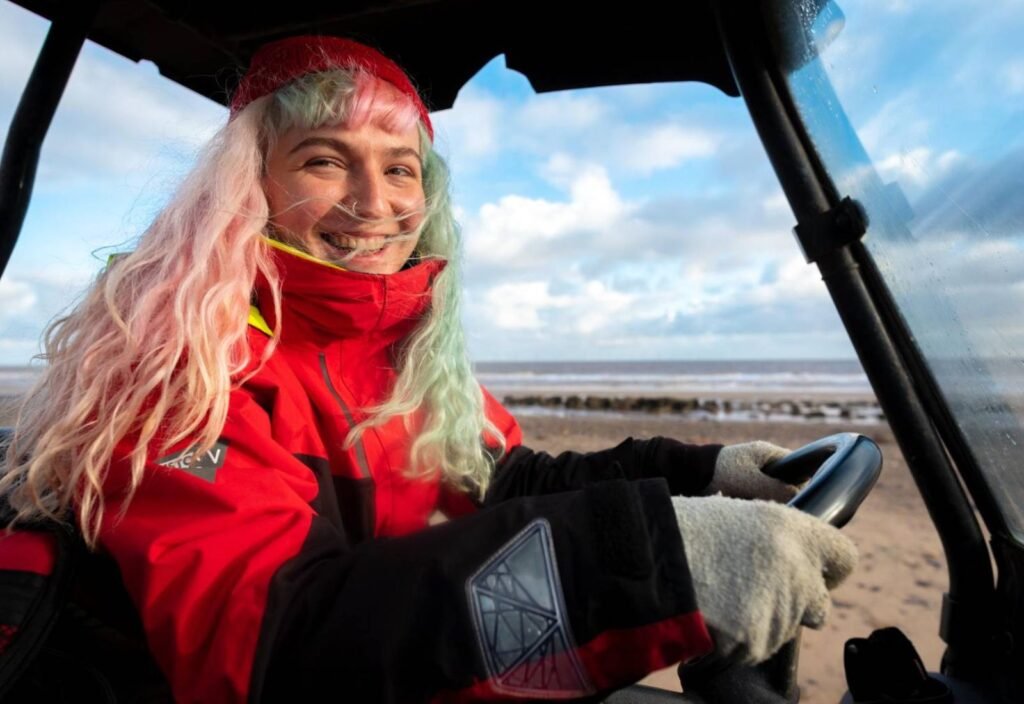Seagrass and Ocean Action – meet the speakers
A one-day Ocean Action Conference will take place on Seaburn seafront in Sunderland on 8 June.
Highlighting ocean action happening across the UK, the conference will feature experts, ocean practitioners, and marine biologists speaking about the challenges faced in rewilding the seas.
Speakers include:
Dr. Richard Lilley, Project Seagrass, Scotland – keynote speaker
Richard is co-founder and Chief Development Officer at Project Seagrass. He’s spent the last decade developing and implementing seagrass research, conservation, and restoration programmes in collaboration with coastal communities.
Project Seagrass works internationally to develop tools to improve seagrass ecosystem awareness, monitoring, and management. At Project Seagrass, Dr Lilley has worked on seagrass research projects in the Caribbean, Indo-Pacific, North Atlantic and Mediterranean seagrass bioregions with a personal focus on the sustainable supply chain management of small-scale capture fisheries.
Emily Cunningham – conference host
As a marine and coastal specialist at the forefront of driving positive change for our ocean and all of us that depend on it, Emily is a true champion of marine conservation and ocean action. Emily led the Local Government Association Coastal Special Interest Group between 2019 and 2022, positioning the group of 57 local authorities as an influential and respected voice on coastal issues.
She is a co-founder and co-author of the model #Motion4theOcean Ocean Recovery Declaration for local authorities. This is catalysing local action towards a sustainable blue economy and ocean recovery, so far benefitting over 2 million residents.
In 2021, she won a national Rising Star Award for her work for England’s coast and its communities, has been named a global “30 under 30” for environmental education, is co-author of the model #Motion4Ocean, and is a Trustee of the Marine Conservation Society. To date, she has secured over £5 million in funding for inclusive conservation projects. The Tyne to Tees coast holds a special place in her heart and she loves nothing more than a bit of rockpooling and a plodge in the sea.
Sara King, Rewilding Britain
Sara is an ecologist with a strong background in rewilding, species reintroductions, and supporting projects on the ground. As Rewilding Manager, working towards Rewilding Britain’s target to catalyse land and marine rewilding across 30 percent of Britain, Sara’s role is focused on engaging with network members, rewilding best practice and knowledge exchange, and leading the strategy to upscale rewilding both on land and sea.
Karen Daglish, Stronger Shores
Karen is the Project Delivery Manager of the Stronger Shores Project, led by South Tyneside Council and is making British coastlines and communities stronger in the face of flooding, coastal erosion, and climate change.
Launched in Spring 2023 the project will provide clear data on the benefits of marine nature-based solutions to protect the coastline. Covering the North Sea coastline from Lindisfarne Northumberland to Skinningrove in North Yorkshire, the project is developing and testing new approaches to aid the fight against flooding, costal erosion, and climate change and experts are learning how underwater habitats such as seagrass meadows, kelp forests and oysters, improve water quality, reduce erosion, wave impacts, create wildlife habitats, improve fisheries and more.
The six-year Stronger Shores project is funded by Defra as part of the £150 million Flood and Coastal Resilience Innovation Programme managed by the Environment Agency, and supported by Newcastle University, University of Plymouth, Tees Rivers Trust, The North Sea Wildlife Trusts, Zoological Society of London (ZSL) and Groundwork North East and Cumbria.
Georgia Bennett, Yorkshire Wildlife Trust
Georgia is Seagrass Restoration Assistant for the Spurn Seagrass Project. She started her journey at Yorkshire Wildlife Trust in 2020 as a voluntary trainee based at Spurn National Nature Reserve. During this time the pilot Seagrass and Oyster projects were just beginning and so Georgia was able to get involved in these and learn about the restoration work taking place.
When more funding became available for another technical staff member on the project, she secured a role which has now transitioned to Seagrass Restoration Assistant. This involves direct restoration of the diminished seagrass bed, along with monitoring the existing and replanted seagrass areas.
Dr Tim Ferrero, Solent Seagrass
Dr Tim Ferrero is a marine biologist and conservationist working at Hampshire and Isle of Wight Wildlife Trust (HIWWT), raising awareness of the marine life, habitats, and protected areas of the Solent.
Tim’s work at HIWWT includes responsibility for delivery of the “Wilder Solent” vision, marine data collection and dissemination, citizen science and marine education and engagement. He currently leading HIWWT’s, “Solent Seagrass Restoration Project”, working on the EU Life recreation ReMEDIES project, seeking to reduce recreational impacts on seagrass, and engaged in further seagrass restoration work through the recently announced Solent Seascape Project. Prior to his move to HIWWT in 2013, Tim worked for over 23 years at the Natural History Museum in London as a researcher and consultant on the ecology and taxonomy of marine free-living nematode worms.
Tim’s work has taken him all over the world, including five memorable trips to Antarctica and by way of contrast, he once undertook fieldwork in Kuwait in temperatures of 54 °C, but he is very happy to be back on the Hampshire coast where he grew up in the late sixties and seventies.
Hellen Hornby, Revitalising NE Estuaries
Passionate about nature and connecting people with nature on their doorstep, through education and volunteering, Hellen has spent over 20 years’ delivering and developing projects focussing on conservation, nature, and blue recovery.
As Programme Development Manager at Groundwork North East and Cumbria, she currently delivers on Revitalising our Estuaries, a project focussing on nature restoration on rivers in coastal communities across the North East and the Tyne Estuary Partnership. These nature-based solutions have created saltmarsh and mudflat, restored lost habitat in heavily modified water bodies and support water quality improvements. These solutions reduce the presence of greenhouses gases by storing carbon in mud sediments and saltmarsh plants, provide flexible habitat options in areas at risk of inundation from rising sea levels, and purifying aquatic systems by removing sediments and pollutants from the water.
Ben Lamb, Tees Rivers Trust
Combining his interests in farming and rivers, Ben has been at the helm of Tees Rivers Trust since its establishment in 2009. He is responsible for having overall strategic oversight of Trust activities and most recently was responsible for planning new estuary developments such as the reintroduction of seagrass and native oysters to the Tees.
Jean Luc Solandt, Marine Conservation Society
Dr Solandt is a marine biologist stuck inside a policy expert. Learning marine biology on the rocky shores of the Isle of Man in the early 1990s, he then did 10 years of tropical ecological survey and commercial fisheries work, studying territorial fish, commercial fish numbers inside and outside MPAs, applying ecological survey techniques for designing MPA management, and leading scientific expeditions.
At the MCS for 20 years, Jean-Luc has been responsible for changing government policy on MPA management regarding damaging fishing techniques, and has been involved in basking shark citizen science, and protection. More recently he is working with local yacht clubs and sailors to reduce impact of boating on seagrass, and still occasionally does survey work in the tropics.
Exhibitors
Conference exhibitors showcasing their project work from across the UK includes: Rewilding Britain; Yorkshire Wildlife Trust; Solent Seagrass; Groundwork NE & Cumbria; Project Seagrass; Explore Seascapes; North Sea Rejects; Climate Action North; Durham Wildlife Trust; Newcastle University; Stronger Shores; and Tees Rivers Trust.
The event is organised by community interest company Climate Action North, in partnership with marine safety specialist Swiftwater Solutions and leading coastal project Explore Seascapes.
The time for talking is over, today we need to act.










